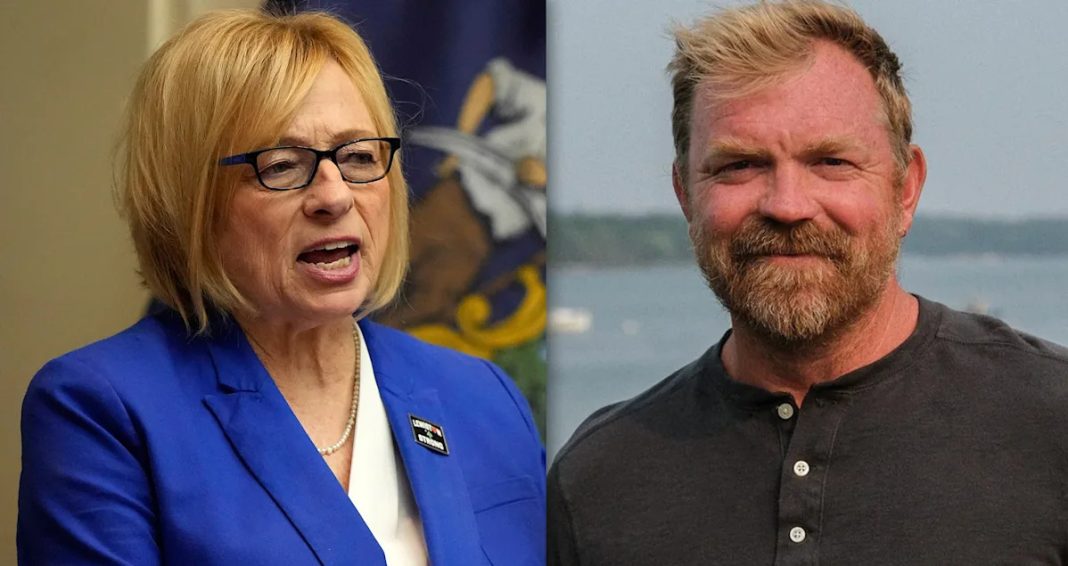Democrats face a steep challenge in their quest to take control of the Senate after next year’s midterms. Any realistic scenario for doing that has to include flipping a seat in Maine that has been held by Republican Susan Collins for nearly 30 years.
Before Democrats can challenge Collins, they have to pick a candidate. The Maine Democratic primary is already shaping up to be a heated contest, one that exemplifies the party’s deep generational tension as it seeks to rebound from its pivotal losses in last year’s elections.
On Tuesday, Janet Mills, Maine’s current governor, officially announced that she was joining the race. Mills, who is not eligible to run for governor again, is relatively popular and has a strong track record of success in statewide races. She was reportedly “aggressively recruited” to run by top Democrats in Washington, D.C., including Senate Minority Leader Chuck Schumer. She’s viewed as such a strong candidate that two of the country’s most respected political forecasters moved the Maine Senate race from “leans Republican” to “toss up” in response to her announcement.
Under ordinary circumstances, someone with Mills’s credentials might be a shoo-in for the Democratic Party nomination. But Mills is 77. She would be 79 at the start of her term if she were elected, the oldest freshman senator in U.S. history. That has raised concerns within the party about both her long-term health and her ability to inspire young voters who increasingly view the Democratic establishment as out of touch.
Several other Democrats are also running. Mills’s toughest competition by far is Graham Platner, a 41-year-old oyster fisherman and military veteran who has centered his campaign around taking on the so-called billionaire class on behalf of ordinary Americans.
Platner has the endorsement of Vermont Sen. Bernie Sanders and has earned praise from a number of high-profile progressive Democrats in the Senate, including Elizabeth Warren, Chris Murphy and Sheldon Whitehouse.
Why Maine matters
Democrats need to flip four GOP seats and avoid losing any of their own in order to win control of the Senate in next year’s midterms. There will be a total of 35 Senate races on the ballot next November, but only a handful are considered to be even remotely competitive. Democrats’ best chances are in Maine and in North Carolina, where incumbent Republican Thom Tillis is not seeking reelection.
Maine is, for the most part, a moderate blue state. It has voted for the Democratic nominee in every presidential election since 1992. Collins has shown remarkable staying power in the state, even when national trends are pushing strongly against Republicans. She was viewed as one of the GOP’s most vulnerable senators the last time she was up for reelection in 2020, but comfortably won reelection despite a “blue wave” in races elsewhere in the country. She won by even larger margins in her two previous reelection bids — including 2008, when Barack Obama won Maine by more than 17 points.
Collins’s reputation as a moderate Republican has been a major reason for her continued success through the decades, but it may also create problems for her this time around. “Collins is meaningfully more vulnerable than she has been in past elections,” elections analyst Eli McCown-Dawson wrote last month. Her willingness to occasionally oppose President Trump, including voting against his “One Big, Beautiful Bill” this summer, has cost her support among Republicans. At the same time, she has faced strong criticism from independents and moderate Democrats for not challenging Trump enough during her tenure.
In a poll taken earlier this year, 71% of respondents — including two-thirds of Republicans — said she did not deserve to be reelected.
The age issue
Mills has said that questions about her age are “a legitimate consideration,” but has pushed back by pointing to her strong electoral record and her track record of standing up to Trump. “I think that I’m the person who can meet the moment,” she told the Washington Post on Tuesday.
Platner has framed the Democratic primary as “a generational race,” but has argued that the divide between him and Mills should be defined by their political viewpoints rather than their ages.
“It’s about generational politics, it’s not about age,” he told MSNBC on Tuesday. “It’s more about whether you’re of the political establishment that’s brought us here or if you’re coming in to change it.”

